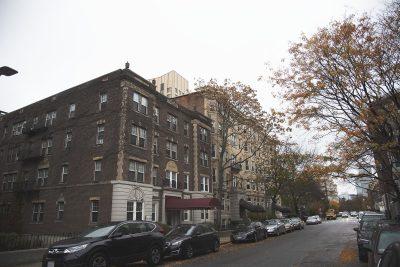Keisha Bannister refuses to sleep on the streets. At 41, the single parent has raised three children by seeking out homeless shelters in between apartments.

In Boston, rent alone took 30 percent of her income.
“First thing I would definitely pay is my rent and my light bill,” Bannister said. “I didn’t really care about phone or cable or something like that because I’m raising my kids. Stuff like that I won’t have the funds to pay for, so something has to be cut.”
A report by Apartment Guide named Boston’s 02215 ZIP code, which encompasses most of Boston University and parts of Fenway, the most expensive area in the country to rent a home.
However, experts say that while rentals do remain out of reach for many foraging for residence in the city, this data does not reflect the true average.
The article, released in early November, places average monthly rent in 02215 — mainly the Back Bay and Fenway-Kenmore neighborhoods — at $5,034.80 in October for a one-bedroom apartment.
Boston’s Department of Neighborhood Development told The Daily Free Press the figure is inaccurate.
Bobby Jafari, the manager of operations at real estate firm Kenmore Properties, said one-bedroom rental units in the area average anywhere from $2,000 to $3,000. Rent for the most expensive places rises into the $4,000 or $5,000 range.
The figure which Apartment Guide based its ranking on is “far-fetched,” Jafari said.
“I’ve been in the area for about 13 years,” Jafari said. “To be honest with you, they are taking all units in general in the area. You have a lot of buildings like Fenway Triangle Trilogy, 1330 Boylston and whatnot, and those rents are much higher.”
Multiple Boston-area publications reported on Apartment Guide’s rankings, including CBS Boston and NBC Boston.
Fenway-Kenmore is home to many luxury apartments that may skew the overall average within the ZIP code, Jafari said, because tenants who can afford it enjoy the neighborhood’s proximity to downtown attractions. But although these high-price units are “a dime a dozen,” Jafari said many of them stay vacant.
Monthly rent for brownstones usually stay in the $2,000 range, Jafari said, while condos might veer up to $3,000 in rent price. He said the rental market in Boston has seen an uprise in recent years, but the firm has noticed the trend flatlining.
“They are 3-percent or 2-percent increases per year; they’re no longer going up $400 to $500,” Jafari said. “If someone decides not to renew, a new tenant would come in.”
Joe Kriesberg, president and CEO of the Massachusetts Association of Community Development Corporations, said good housing data is difficult to collect for multiple reasons.
“The affordable units are off-market, so they’re one thing,” Kriesberg said. “Then there’s existing rental housing and new rental housing and most of the new rental housing is quite expensive. So the overall average goes up and how much of that is driven by new housing versus existing is hard to get a handle on.”
Kriesberg said while overall rental prices do continue to swing upward, recent changes have not been very significant. New housing has recently gone up in Fenway, Kriesberg said, but the units are too expensive for most renters to afford.
“I think the issue is that the housing is completely out of the reach of middle-class people, nevermind low-income people,” Kriesberg said. “And [the question] seems to be if there’s any affordable housing left in those neighborhoods. Much of it is at risk of being lost.”
Despite high housing prices, Kriesberg said Back Bay does not commonly see evictions because the area is historically a wealthy community. Fenway is a different environment, however.
“We’re seeing much more of that in the Fenway [Community Development Corporation],” Kriesberg said. “There’s a lot of organizing to prevent evictions, because there are still some reasonably affordable apartment buildings, although fewer and fewer.”
About a third of Boston apartments are made affordable through government subsidies or rent restrictions, Kriesberg said, and expanding the city’s revenue is necessary to keep subsidies flowing.
“If we could grow the revenue, we could buy and build more homes and keep those affordable — that’s the most direct and concrete way to do it,” Kriesberg said. “The city’s inclusionary policy is also an effective tool so that as new buildings get built, they’re required to include affordable units. We should keep doing that and probably increase the percentage of units that have to be affordable.”
Boston’s Inclusionary Development Policy, initiated in 2000, mandates rent restriction in a portion of units within new housing developments applying for an exception to the zoning code to maintain affordability for certain income groups, according to the Boston Planning and Development Agency. The number of income-restricted units required in each building lies around 13 percent.
As part of the city’s housing plan to adjust to a growing population, 20 percent of 30,000 newly created housing units will be income-restricted, according to an Oct. 1 press release from the Mayor’s Office.
Back Bay resident Taylor Labbe, 21, rents an apartment in the neighborhood. Labbe said that as a student, she works full-time through a co-op program to pay for her housing.
“I think Boston is one of the most expensive places to live just because of the influx of people that are coming in, like academia,” Labbe said. “A lot of people are just tending to move toward cities now as opposed to suburban areas.”
Derrell Walker, 31, who is currently homeless in Boston, said he would not consider living in Boston because rent is too costly.
“In Boston, I can’t rent a home. I got to go out of town where it is cheaper,” Walker said. “And if I can’t, if I got to get something in Boston, I got to get Section 8, get some public assistance, just to get in somewhere.”


